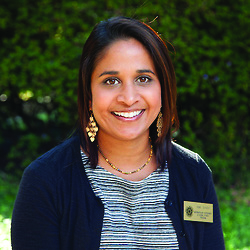Correction: In the April issue of Mast Magazine, the class cited in “Global Perspectives” has been corrected from GLST 357 to IHON 328.
BROOKE THAMES; Mast Editor-in-Chief; mast@plu.edu
Ami Shah finds a home for both advocacy and academic work as a Professor of Anthropology and Global Studies at Pacific Lutheran University.
Her interest in the intersection of action and academia was cultivated while earning her Master’s and doctoral degrees in Development Studies from the University of Oxford.
At the time, international development was an unusual focus due to its interdisciplinary nature. Shah, however, gravitated toward the area of study because of the way it brought her humanitarian interests into her education.
“One of the things [my friend] used to say when he would explain the degree to people is… everyone who wants to study development studies wants the world to normatively be a better place,” Shah says. “I guess that’s one way where academics and activism mesh really well.”
Shah’s academia particularly revolves around issues facing the developing world, especially relating to popular culture and advertising. As a professor, she often finds ways to combine her enthusiasm for global advocacy with the curriculum she teaches.
Her International Honors 328 course explores social justice relating to global interactions. Throughout the class, students question the nature of activism and ponder how individuals can be better global citizens. Shah incorporates both development theory and real-life examples like Kony 2012, a viral documentary film designed to rally masses against Ugandan militia leader Joseph Kony.
Students then develop projects that examine particular issue around transnational advocacy and suggest ways to improve activist methods. Some proposals include spotlighting the voices and narratives of those affected by issues of inequality and not waiting until “there’s gloom and doom on the TV” to get involved in preventative work.
Shah sees teaching students to think critically about global development and advocacy as a form of activism in and of itself.
“If part of what I’m interested in is how we relate to others, then teaching about that and teaching about some of the problematics of contemporary forms of global interaction is part of it,” she says. “If I want things to change, the only way they do is if people are aware of problems to begin with.”
Shah’s own experiences researching in developing countries like India and Nigeria helped her tailor how she personally approaches global activism. Shah says she hopes to utilize academia and professorship to help students reflect on how to engage with the world in productive, positive ways.
Ami Shah: Q & A
What are some of the ways our activism is ineffective?
I think a lot of times we do things for a feel-good effect and don’t necessarily stop to reflect on what our actions support or how we represent others in our actions. One of my constant reminders is something that someone who worked around… humanitarianism would say — ‘Good intentions are not enough.’ We have to think about the consequences of our actions and how we relate to people as well.
Any particular examples you’re examining in class?
In one of my classes, we’re learning about consumerism — when people shop to save the world. We’re looking at one example that’s about stopping AIDs and how it’s [framed] like all you have to do is buy this t-shirt and then you’ll save somebody’s life. The person’s life is really what you’re buying. One of my colleagues talks about this as ‘commodifying compassion,’ but we don’t really have to do much. We get to see this poor, suffering person [and] we buy something to feel better about it. We’re not questioning structures, and we’re thinking it’s okay to paint people as hopeless and without agency.
How do you think we can do global activism better?
I think compassion is important. I think our empathy doesn’t have to be limited. Human beings are amazing in that way of being able to care about lots of different things. I think we maybe shouldn’t trick ourselves into thinking that empathy is doing. I think we need to make our choices [actively] about what we do.
Do you encourage bringing students into activism through academia?
I don’t want to tell students what issues they need to be concerned about or even that they should agree with me about what should happen. I want them to think reflectively about what they do … [and] encourage them to think about different ways of viewing the same thing. I think that in and of itself is a form of activism. Whether they choose to do more, I hope they have the tools to do so in ways that are more productive. I encourage them to be engaged with the world.






















